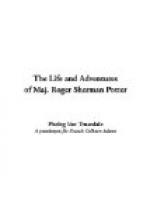he of his uniform, that an attendant placed before
him-not a napkin-but a large tablecloth, which so
added to the humorous aspect of his face that even
the priests present could not resist a smile.
All now proceeded as jubilant as a marriage in Canon.
The general gorged himself as never minister gorged
himself before. Even Mr. Tickler, who sat at his
right, looked with astonishment at the skill and alacrity
with which his master demolished the various dishes
set before him. As to the punches, highly-spiced
cordials, and wines, he mixed them indiscriminately,
and drank them with such a rapidity that Tickler became
alarmed for the safety of his understanding. Indeed,
it was so evident that his intellect was becoming
deranged that the officers ordered the courses hurried
as much as possible, for they were anxious to be rid
of the priests, before whom they would not for the
world have their country’s great representative
do aught damaging to his reputation. When, then,
the attendants came to remove the cloth, the general
looked up with astonishment, and addressed one of
them thus: “I would not have you stop for
me, gentlemen waiters, for I am a slow and dainty
eater, and would like another turn at that well-seasoned
pie.” Tickler, who had been no way dainty
about the number of glasses he quietly quaffed, touched
his master significantly on the elbow. “Your
excellency has need to look well to his manners,”
said he, “for those priests have their eyes
polished, and are whispering no good.”
“That dish of which your excellency has eaten
with so much relish,” rejoined the waiter, “is
snale patte, a dish so rare and savory that it is
all eaten up: but if your excellency will be patient
we will have some more prepared expressly for him.”
“Heavens, sir! spare yourself the trouble; for
if it be such meat I have been eating, why then, to
the priests with it; for I shall soon need a doctor.”
The priests overheard this remark, and thereupon arose,
returned thanks, and retired. The chairman rose
as soon as they were gone and made a speech, which
he addressed to our hero, and with such clever irony
that he sent the whole company into a titter.
He congratulated our country on the possession of so
famous a diplomatist as General Potter, a gentleman
whose name would be a gem in our history, and whose
wonderful achievements as a statesman had shed lustre
upon our country’s fame. “We have
accompanied him here in safety; we regret to part
with him; but feeling that he will prove himself a
faithful sentinel of our country’s interests,
we devoutly pray that his mission may be an unprecedented
round of successes,” said he. Indeed, he
astonished every one present with his facility for
paying compliments, and so confused the general that
he was at a loss what to say in reply. In short,
he declared government had a rich inheritance in such
persons, and was moved by a wise policy in sending
abroad gentlemen not encumbered with a whole Babylon
of tongues.




